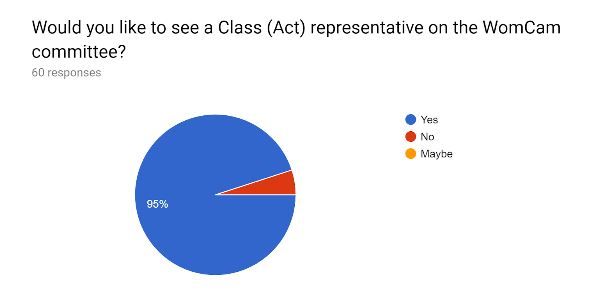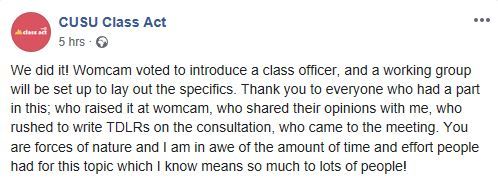
Womcam votes to introduce class officer
The consensus was reached to ‘formalise class representation as a position on the Womcam committee’.
During the CUSU Women's Campaign meeting, which took place yesterday, results from a survey were announced which indicated that 95% of respondents were for the introduction of a class representative.

A graph which details the outcome of the survey from the Womcam X Class Act consultation. Source.
This has followed a series of heated discussions surrounding the proposal, which were summarised in the meeting. Many of those who raised concerns about the possible introduction of a class rep were working-class black women, who highlighted the existence of 'BME communities who do not feel comfortable identifying with working-class labels in the same way as a white person would'. This lead to the further discussion of how the 'important and often overlooked relationship between class and race' would possibly not be addressed if a white person were to occupy this role.
The challenges in measuring class were also considered, as well as the dilemma regarding how those who identify under 'class rep' would be policed. It was further suggested that class struggles are already central to the socialist movement, therefore a 'specific intersectional liberation role' isn’t necessary to make sure this work is done.
Yet others suggested that the existence of a class rep will place focus on the elimination of social alienation amongst working class women at the University. The history of the university's Women's Campaign was also alluded to by Lola Olufemi, who was CUSU women's officer from 2016-17, and whose statement was read out in the meeting. She mentioned how WomCam was 'born out of a group of women who came together because they realised that the university was not working in their interests', adding that WomCam members who occupied Senate House in the 1970s to demand better childcare provision were most likely working class.

CUSU Class Act's announcement of the decision on Facebook. Source: CUSU Class Act.
The current nature of WomCam was also raised, with some referring to it as 'an exclusive and an elitist space' which marginalises working class women. The nature of WomCam's political activism was also criticised as 'flawed', as some comments have been made condemning the lack of practical action being taken to combat issues in comparison with other student activist groups. Consequently, it was felt that class rep should be mandated to campaign on such issues, rather than just being a representative role.
Despite the debate surrounding the proposal, a consensus was reached in favour of a class rep by the end of the meeting. It was also confirmed that a working group will be established to continue such discussions and disclose their findings to the forum.
Despite the range of stances on the issue, it was asserted that 'more working class representation is paramount to how WomCam moves forward in the future'.
Cover image: CUSU Women's Campaign.









































